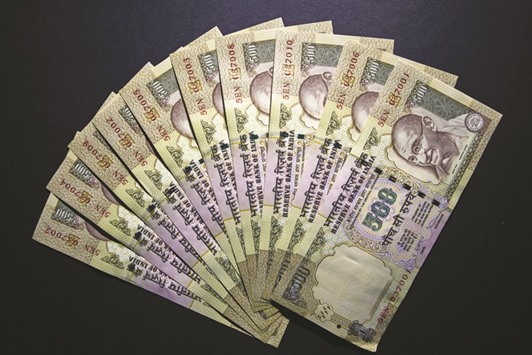Indian stocks dropped as concern mounted that the rally that pushed up the benchmark index to near a one-year high yesterday isn’t supported by corporate earnings.
Dr Reddy’s Laboratories tumbled the most in eight months after the drugmaker’s first-quarter group net income slumped 76%.
Maruti Suzuki India slid the most in a month after its June-quarter results showed operating margin narrowed. Motorcycle maker Hero MotoCorp retreated the most in six weeks. State Bank of India and ICICI Bank were among the worst performers on the S&P BSE Sensex.
The Sensex lost 0.4% at the close in Mumbai. The gauge’s 22% rebound from a low in February amid persistent inflows from overseas funds has sent its valuations to a 15-month high. That makes it prone to declines if the recovery in company earnings fails to gather steam. Six of the 10 firms in the index that have reported results so far have disappointed investors.
“The fall we saw towards the end of the day was because some of the earnings were not up to the mark,” Rajesh Agarwal, the head of research at AUM Capital Market, said by phone from Kolkata. “A correction is due, but any drop would be a buying opportunity in the medium term as we’ve seen continuous buying by foreign investors. That is driving the market up.”
The Sensex is set for its fifth monthly climb, the longest run of advances since August 2014, as foreigners bought $1.2bn of shares in July amid speculation emerging-markets will benefit from additional stimulus following Britain’s vote to exit the European Union. Global investors have been buyers of Indian shares for five months, the longest stretch since November 2014, as above-average rain improves the outlook for economic growth and food prices.
Still, high valuations are damping investor enthusiasm in the near term. For instance, the rollover rate in July futures tied to the NSE Nifty 50 Index was at 41%. That compares with a six-month mean of 43% two days before expiry, data compiled by Bloomberg show. In India, monthly derivatives contracts expire on the last Thursday of the month.
“Not many people are willing to take big bets as valuations are high,” said Kishor Ostwal, managing director at CNI Research, an equity research provider in Mumbai. “The market is poised for a correction in the next few days.”
Dr Reddy’s tumbled the most since November 26. Its first-quarter group net income slumped 76% to Rs1.54bn. Sales were Rs31.6bn compared with Rs37bn a year earlier.
Maruti Suzuki fell 1.7%, paring this month’s gain to 6.8%. Net income climbed 23% to Rs14.9bn ($221mn) in the three months ended June. Car sales rose 2.1% from a year earlier, but fell 3.3% compared with the period ended March. Exports slid to 26,103 units from 35,635 a year earlier. Ebitda margin narrowed to 15.1% from 15.6% in previous quarter, and 16.6% a year earlier. “Fall in exports and concerns on local volume growth are the key factors weighing on the stock,” Shaukat Ali, an analyst at Quantum Securities, said by phone. “Also, the yen appreciation is likely to hurt Ebitda margins by around 30-40 basis points in the next two quarters.”
Meanwhile the rupee yesterday recouped its early losses to close stronger against the US dollar amid caution ahead of policy meetings of key global central banks scheduled later this week.
The US Federal Open Market Committee is due to start its two-day monetary policy meeting on July 26, with the market expecting the US Federal Reserve to keep the policy steady.
Traders will also be eyeing Bank of Japan’s two-day monetary policy meeting, due to start on July 28, with markets expecting additional fiscal and monetary stimulus to jump-start the country’s anaemic growth.
Traders are also cautious as the Constitution amendment bill to amend the goods and services tax (GST) is likely to be listed this week for the monsoon session of Parliament, after finance minister Arun Jaitley meets state finance ministers on Tuesday.
The currency closed at 67.28, up 0.12% from its previous close of 67.35. The local currency opened and touched a low of 67.43 a dollar, a level last seen on July 8.
So far this year, the rupee is down 1.78%, while foreign institutional investors have bought $4.14bn in equity and sold $860.90mn in debt markets.

The rupee closed up 0.12% to 67.28 yesterday
